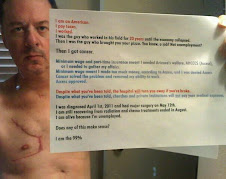Jim Seida / msnbc.com
LA PUENTE, Calif. — Rose Gudiel and her family were squatters in their own home. They had lost a two-year battle against foreclosure, and the eviction date had arrived. They hunkered down in the house on Sept. 28, surrounded by dozens of homeowner advocates and friends, hoping to stave off forcible removal.
“(The bank) kept saying we can’t do anything. Your case is closed,” said Gudiel. “Our stand was, ‘No, we’re not leaving. This is our home. We worked hard for it and we’re just not going to leave.’”
But instead of the anticipated confrontation, there was a dramatic reversal of fortune. Fanny Mae canceled the eviction notice and offered the Gudiels a loan modification that could enable them keep their home.
Why? Fannie Mae and loan servicer OneWest won’t discuss the case. But nonprofit advocates say a series of bold protests — with reinforcements from the “Occupy Wall Street” movement — and a spate of media interest put Rose in the limelight and forced the banks to back down.
It was a small victory — and Gudiel still has to finalize her deal with the bank — but one that Southern California housing activists hope to repeat. It also provides an example of how the sprawling "Occupy" movement — often criticized for its lack of focus — can lend muscle to specific goals pursued by organizations and individuals.
Gudiel’s version of the foreclosure on the 1,200-square-foot home she has shared with her parents and a brother in this working-class suburb of Los Angeles since 2005 is starkly at odds with the limited information provided by the banks.
According to Gudiel, when she tried to make the $2,500-a-month mortgage payment two weeks late in November 2009, OneWest refused the payment and instructed her to pursue a loan modification, a long process that ultimately ended in rejection in January.
Gudiel said she fell behind when the family suffered a tragedy and two financial setbacks: Her brother, Michael, was killed in a drive-by shooting, meaning he was no longer contributing to the mortgage payment. At the same time, Gudiel was temporarily earning less in her job with the California Economic Development Department after being furloughed because of the state budget crisis.
Shortly thereafter, Rose Gudiel’s income returned to normal, and a second brother moved in to help with the mortgage.
Gudiel continued to work through the loan modification process but encountered obstacles at every turn, said Peter Kuhns, director of the Los Angeles branch of Association of Californians for Community Empowerment, a nonprofit that has been working on her case.
“Month after month, she supplied documentation to the bank for the modification,” he said. “At the same time, each month she saved the money she would have used to make the house payments so that she could make back payments (so) at any point OneWest could accept her money.”
An impenetrable processGudiel and her advocates say the process was impenetrable. OneWest, the loan servicer, offered no explanation as to why she failed to qualify for loan modification programs. And they say it was impossible to find a contact to work with at Fannie Mae, the lender.
“It’s hard to even know whether they were trying to help her modify the loans,” said Kuhns. “Up until the point when she started to go public, the bank was saying she was not qualified.”
Fannie Mae and OneWest wouldn't divulge details of the case, citing privacy concerns, but indicated that much of the information that has been reported on the case by local media is inaccurate.
OneWest referred questions to the public relations firm Sard Verbinnen & Co., which said that Fannie Mae, which holds about one-third of the mortgages in the country, had not authorized them to modify the loan.
“OneWest is pleased that it has been able to work with Fannie Mae, the owner of the loan, to authorize it to offer the Gudiels a loan modification that would allow the family to stay in their home,” the firm said in a statement.
Amy Bonitatibus, a spokeswoman for Fannie Mae in Washington, D.C., said: “We have been working closely with all parties throughout the process to identify a solution — and have offered the borrower several solutions that she declined. We have approved another solution through the servicer that we hope the borrower will accept. Our goal is to resolve the issue in a responsible and appropriate way that the borrower can remain in her home.”
Tapping the power
Before the bank's change of heart, with prospects for keeping the home looking increasingly bleak, the Gudiels decided to go public.
When the five-day notice for eviction notice was posted in September, the family announced they would not leave voluntarily. They rallied loyal neighbors and friends who set up an encampment in her yard. A steady stream of advocates and volunteers brought in supplies and food, and TV crews showed up.
On Oct. 1, just days after the eviction deadline, thousands of protesters started gathering outside Los Angeles City Hall to launch the “Occupy LA” protest — the local version of the “Occupy Wall Street” protest in New York City. Gudiel thought her story would play well with the protesters and made an appeal at one of the gatherings' first daily “general assembly” meetings.
Gudiel’s story resonated with the crowd, which generally holds the belief that corporate greed and influence have driven the country off the rails.
“At Occupy LA, foreclosure is not the main thing, but… it really is the one thing that has truly pushed people to the limit,” said Sergio Ballesteros, an “Occupy LA” organizer who works on its education and workshops committee. “It is the one thing that is so tangible … kicking people out of their homes that some feel they were swindled into ... coupled with the fact that these banks that are foreclosing actually are making a lot of money. This is at the heart of the idea that we have to do something.”
After her talk, some protesters went to Gudiel’s home in the suburbs to join the vigil, and some stayed to camp.
On Oct. 4, “Occupy LA” protesters joined in a 200-strong protest with Gudiel in front of the $26 million Bel Air mansion of OneWest CEO Steve Mnuchin.
Visit msnbc.com for breaking news, world news, and news about the economy




























No comments:
Post a Comment